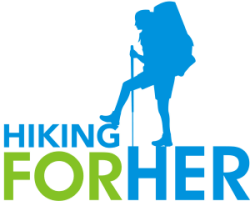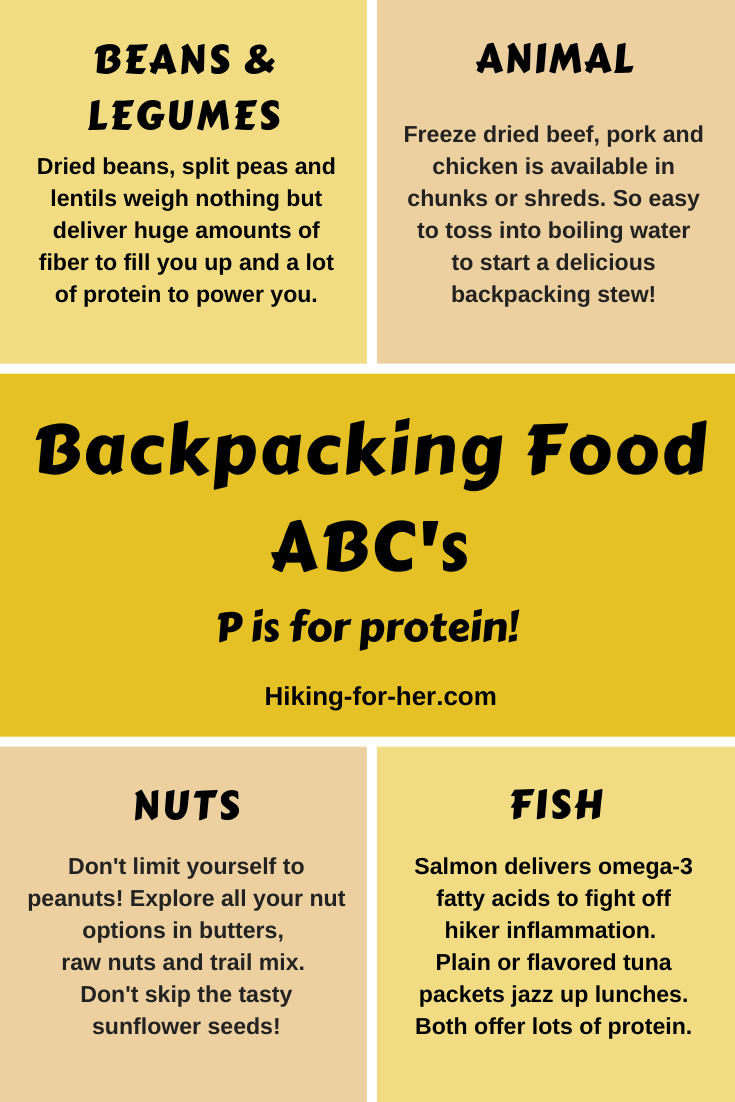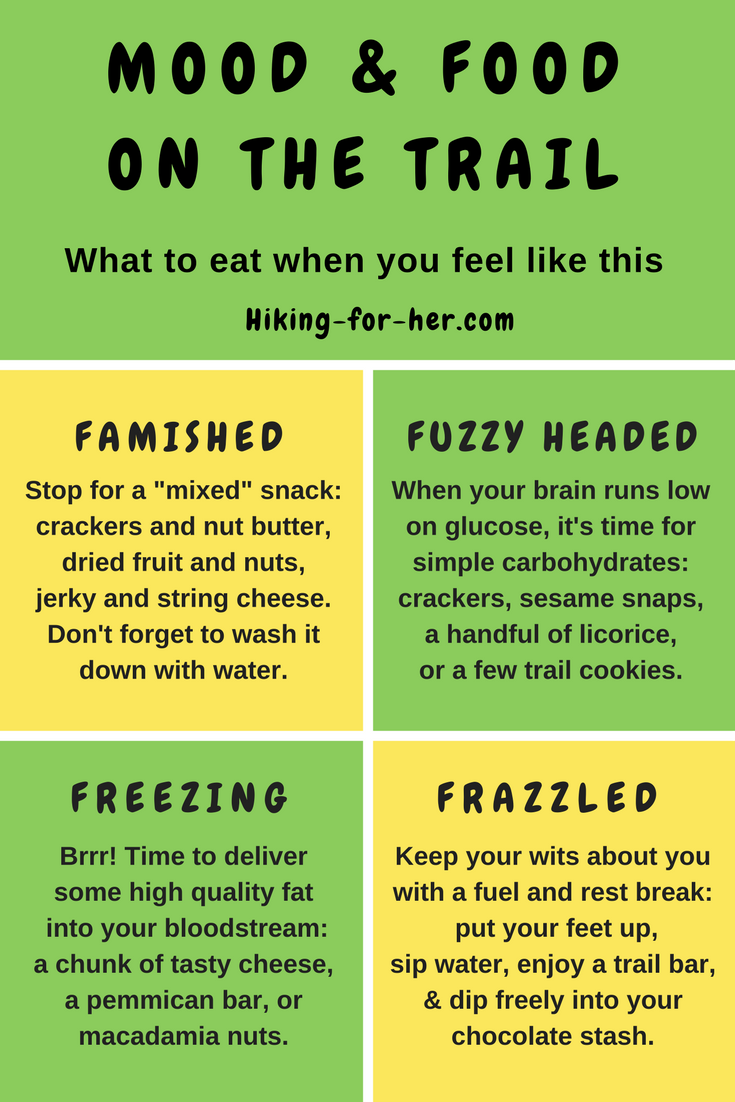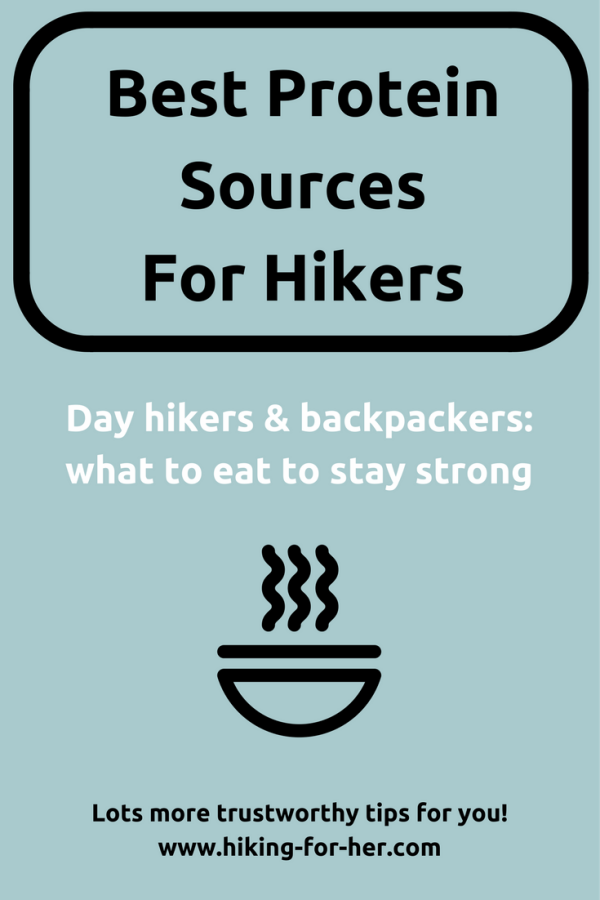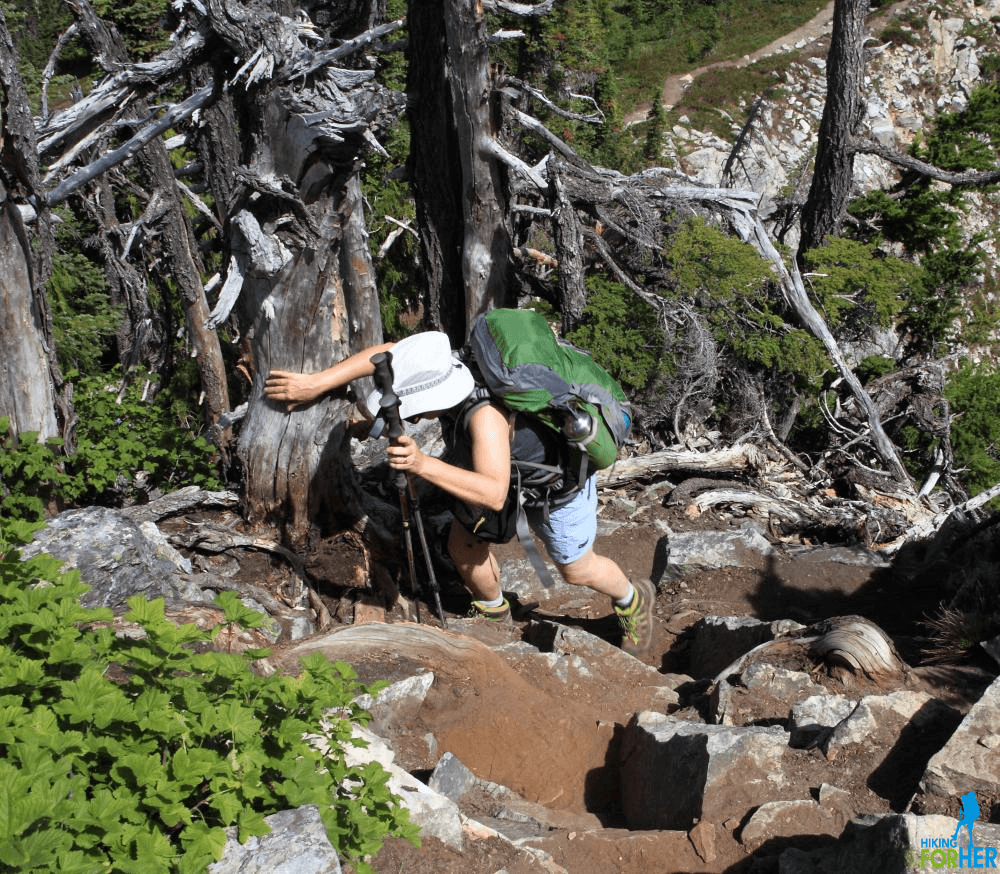Best Protein Sources For Hikers:
How To Stay Strong Longer
By Diane Spicer
This handy resource on the best protein sources for hikers not only names names.
It tells you exactly when to use each protein source as a hiker for top performance.
Why is that important?
- Because not every hiker needs high protein food sources.
- Or high protein amounts in every meal.
Read on for the details, or skip to the best protein sources for:
Note: This is not dietary advice!
You know your own body, its likes and aversions, its intolerances and allergies, its cravings and digestive capacity.
Use these best protein sources for hikers as suggestions, rather than as an all encompassing exhaustive resource list.
- If in doubt about your body's reaction to a new protein source, do an "at home" test before bringing the food along on a hike.
Hiking For Her is not responsible for your trail choices, only you are.
You can skip the next geeky section if you're not keen to admire what a protein molecule can do for you on your next hike.
But if you want to geek out...
Here's a crash course on why you, an ambitious hiker, need protein.
Every system of your body, and every cell in your body, uses protein molecules for important functions.
A few examples of your body's protein usage:
- brain neurotransmitters
- digestive enzymes
- hormones for blood glucose balance
Protein also keeps your hiking body strong
You rely upon the strength in your skeletal muscles and the connective tissues surrounding them to get you on the trail.
- Sufficient protein intake gives you strong muscles, tendons and ligaments.
Another way to stay strong as a hiker is to maintain your body weight by avoiding (off trail) food cravings and binges.
- Adequate protein intake helps regulate appetite, which can be useful on a backpacking trip to keep you feeling full. Read more about that here.
- If you're hiking for weight loss, here are some tips.
A high level of immunity becomes important on the trail
When you hike, you're pushing your body hard.
Vigorous exercise over extended periods of time (backpackers, we're lookin' at you) has been known to suppress immune function.
Your white blood cell warriors require protein to do their defensive jobs, so give 'em plenty of it.
- Fight off "the crud" (technical term) by eating enough protein every day of your backpacking trip, not just on binges when you get off the trail.
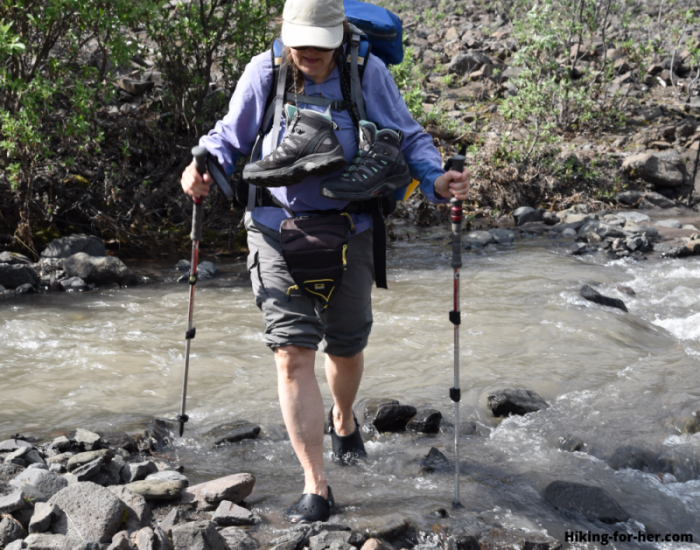 You put your body through a lot of changes as you hike, so be supportive through good protein sources
You put your body through a lot of changes as you hike, so be supportive through good protein sourcesOne more protein thing to geek over
As you hike, your muscle and brain cells in particular are sucking down glucose at a fast rate.
That's why you're counseled to consume carbohydrates for energy while you're in the thick of it on a hike.
But skipping protein for breakfast and in trail snacks can be a mistake, for two reasons:
1. Protein molecules stay in the stomach and take longer to be pulled apart after ingestion, which keeps you feeling full longer and stabilizes blood sugar so you can avoid the "start fast and then crash" cycle.
2. Protein rich foods are super low on the glycemic index, which reinforces what we said above on supporting the stabilization of blood glucose levels between meals.
Okay, enough with the science stuff.
Let's get practical about the best protein sources for hikers, and specifically for types of hikers.
How much protein do I need every day?
Great question! It's important to approach the answer with your unique baseline.
The USDA has this online calculator of nutrient needs, customized for your age, weight, height and activity.
You can find specific information on protein requirements at this Harvard Health Publishing site.
But here's the question you're wondering about in the context of this discussion.
How much protein do I need on the days I hike?
It stands to reason that when you hike, nutrient requirements go up to fuel your hard working body.
How much do they go up?
It depends on who you are, where you hike, what type of hike you do, and how good your digestion and gut health is.
Let's look at a few scenarios of the best protein sources for hikers of various types.
I'll leave it up to you to figure out exactly what protein numbers you want to hit, using the resources shared above.
Best protein sources for day hikers
A portion of your day is spent hiking, usually with a light load and good trail.
You want to feed your hunger and fuel your muscles, but not carry a lot of heavy food that is laden with chemicals and junk.
What to pack as the best protein source on a hike?
Animal based protein sources for hikers
Dried fish and dried meat (jerky) are so convenient to pack for lunch:
- lightweight,
- varied textures and flavors available,
- and pretty cost effective for the amount of protein you receive per serving.
But not all jerky is created equal.
I prefer "clean" protein sources like this EPIC bison jerky.
These high quality protein sources seem expensive compared to the stuff that hangs out near the checkout at your local grocery store.
And if bison doesn't strike your fancy, they have chicken, venison and beef jerky.
This good stuff will treat your liver and kidneys well, while delivering delicious, satisfying protein to your body.
Plant based protein sources for hikers
You want a protein bar that ticks all the boxes for optimum fuel:
- a ratio heavier on protein than carbohydrates
- high fiber from the plant source(s)
- low sugar
- no weird ingredients or colors
Great taste wouldn't hurt, either.
And you might also need to be gluten free and/or keto.
Check out these bars: IQBAR Brain and Body Plant Protein Bars.
Best protein sources for hikers who carry heavy loads
Sure, we're looking at backpackers, especially section hikers and thru hikers.
But other hikers carry heavy loads, too:
- backcountry snowshoers and skiers who carry avalanche gear
- climbers who haul hardware for multi day trips
- parents carrying babies and toddlers
- field geologists gathering specimens for further study
- photographers with a tripod and multiple lenses
You get the idea!
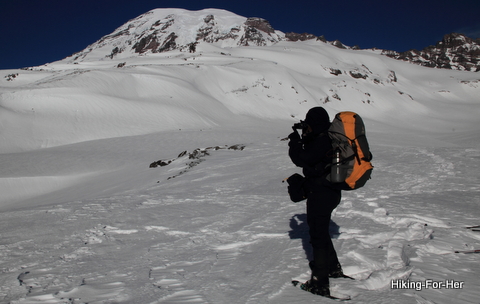
And sure, I also get it: protein sources can be heavier to carry than carbs.
- You want the biggest protein punch for the weight.
You're also tired, so you want something super simple to prepare or consume quickly.
What to eat when you are carrying a heavy load on a day hike
You can get away with a low protein lunch/snack menu, and make it up at dinner once you're off the trail.
But I caution you against skipping protein with your breakfast. It sets you up for sluggish, tired trail behavior midway through the morning.
Around one third of your breakfast calories should be protein.
In a rush to get to the trailhead?
- Toss raw nuts into your breakfast oatmeal, or chew on them as you drive.
- Try sipping a high protein smoothie, using the protein powder or yogurt of your choice.
- Eat a few hard boiled eggs which were peeled ahead of time. At 6 grams of protein per egg, you're doing yourself a big favor. Too bland by themselves? Slather on some salsa! Or crack open a to-go salt packet.
- Pre-made bacon can also be your friend before a hike, as long as the bacon grease has been minimized (to avoid a gut ache). Turkey bacon is a good choice for this reason.
What to eat if you are carrying a heavy load on a multi day trip
Lots of backpacking protein choices for you:
- Sardines or anchovies (also give you a salt hit to replace electrolytes): shovel them in with crackers or your (clean) fingers, oil and all
- Canned mussels for your muscles!
- Foil pouches of tuna with the fixings (opt for oil packed, for the extra calories and satisfying fats if you're worried about energy levels)
- Foil pouches of no drain chicken meat to add to stews or soups
- Pouches of wild pink salmon
All of these choices can be dug into quickly, or fancied up with spices and herbs and added to prepared beans and grains for a bigger meal once your boots come off in the evening.
Trail note: Always pack out your garbage, most especially these pouches and tins.
More choices of proteins for backpackers
Try these light weight protein sources when you're burdened with a heavy pack:
- whey or casein powder
- high quality nuts (raw, roasted, salted - you decide what's palatable)
- sausage
- precooked bacon
- soba (buckwheat) ramen noodles
Trail tip for you
On the first few days of a backpacking trip, bring along one of the best protein sources for hikers: whole milk cheese, with Swiss cheese being highest in protein.
Dehydrated cheese powder can also be one of the best protein sources for hikers because it's lightweight, cheap, and can be added to snacks and entrees anytime.
Best protein sources for hikers over the age of 50 (or so)
Digestion can slow down as you age.
So gear your protein sources to easy digestibility:
- Nut butters (peanut being highest in protein)
- Beans that don't need a long soaking time (lentils, for example)
- Fish or meat packed in water, not oil
The vigor of your immune system also is waning, and regular protein consumption will help you to keep building strong white blood cells so you can effectively fight off pathogens you encounter in trail dirt.
Or from your trail buddy's unwashed hands.
- Just sayin'.
So make an effort to sneak in protein with every snack and meal.
Read more about menopausal hiker nutrition here.
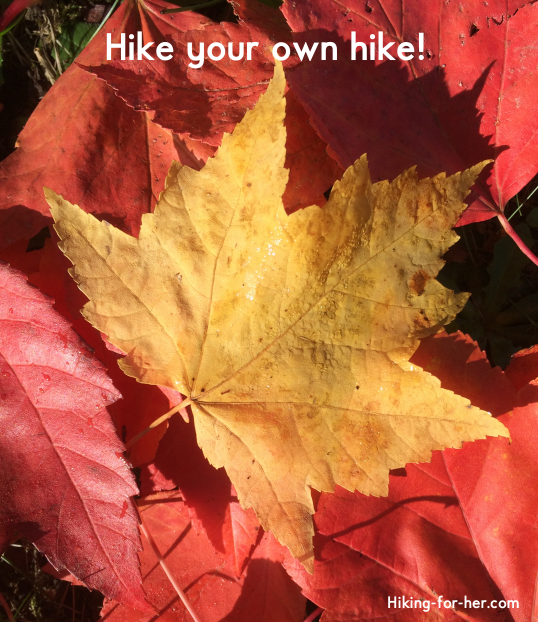 Just be sure you're fueled up with enough protein
Just be sure you're fueled up with enough protein
Best protein sources for hikers who prefer veggies
There are various types of vegetarian hikers, including:
- ovolacto (eat eggs and dairy)
- lacto (dairy)
- pescatarian (fish)
- vegan (plant based diet)
Let's just tackle the "no animal products" dilemma in terms of getting enough protein on a hike.
You can sort yourself into the correct "tips" category, right?
Or if you're planning backpacking menus for vegetarians but don't know the food rules, get up to speed here.
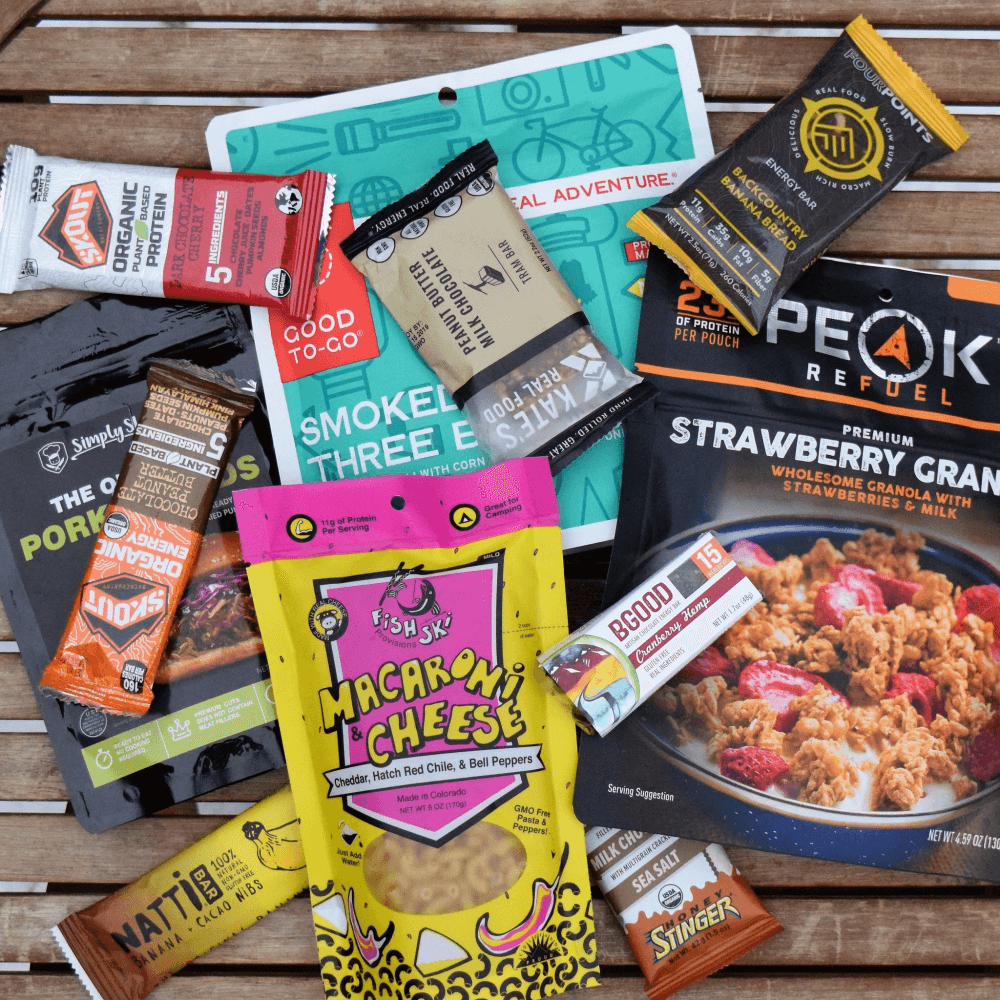 Check the protein numbers on labels to find the best hiking snacks
Check the protein numbers on labels to find the best hiking snacks
Best protein sources for hikers: vegetarian day hikers
Make some tremendously tasty sandwiches (your choice of bread) with these protein rich plant based ingredients:
- black bean puree (spice it up with BBQ sauce if you're feeling a yearning for beef)
- dehydrated hummus (chickpea or garbanzo paste) with a layer of pesto (ground nuts) on top
- nut & seed butters, and please think beyond peanuts (almonds, cashews, sunflower & hemp seeds are delicious)
Worried about possible food poisoning on a hot day?
- Gotcha covered with these hiking food safety tips!
Vegetarian backpackers
Here's an easy, inexpensive way to snack on protein as you set up camp:
- Bring dehydrated versions of black bean puree and hummus for dips before dinner
- Or use as snacks along the trail when you have plenty of water for hydrating.
Patagonia Provisions makes an extremely tasty soup mix, which I review for you here.
More good protein rich food on a backpacking trip:
- soy substitutes for meat: soy protein, shredded tofu, tempeh
- hemp seeds
- textured vegetable protein (TVP, also called textured soy protein)
- dehydrated yogurt powder
- pea protein
- vegan jerky
- quinoa (a high protein grain that cooks quickly, pairs well with any spices, flavorings, beans or other grains)
- peanut butter powder added to your beverages or liquid meals
- any kind of cheap, quick cooking legumes that appeal to you, such as lentils
Can carbs and protein be friends?
Most hikers know this mantra: Carbohydrates = fast fuel.
And that's enough knowledge to get you down the trail, and back to the trailhead, for casual day hiking or a quick overnighter.
But once you begin to tackle double digit mileage, carry a lot of gear, and throw in some elevation gain and loss, your muscles need more than fast fuel.
They need to rebuild from wear and tear "injuries"
- Amino acids in protein are building blocks for this necessary activity.
And you need a way to tame your big appetite.
- Enter the star of that particular show, protein.
So before we go...
A few more protein tips
If you find yourself ravenous (capital R) even after you eat, you need more protein.
- Make a note for next time to pack more, or a different variety.
Try drinking more water with meals to maximize your digestion and add volume.
If you pass foul smelling (sulfurous) gas after eating protein, your digestive enzymes aren't up to the job of pulling apart the long strings of protein molecules into amino acids.
- If beans are the culprit, ease off your consumption or carry tablets of digestive enzymes.
- If a heavy protein meal is the culprit, you might not have enough stomach acid to begin or finish protein digestion in your stomach. Get this low stomach acidity checked out when you're back at home.
Your take home message
on the best protein sources for hikers
Not every protein source will agree with your digestive system.
Experiment at home before making your backpacking hiking menu.
You can try to change the microbial populations in your gut, by ingesting prebiotics like asparagus and probiotics in yogurt or capsules.
- Or carry some prebiotic powder packets for daily ingestion on your hiking trip.
Or you can give in gracefully and keep notes in your trail journal about what works, and what definitely does not work, in your backpacking menus.
Do better next time!
Best protein sources for hikers -
any questions about this?
It's tough to cover every question you might have, so contact me and I'll dig a bit deeper with you.
Carbohydrates get almost all of the attention with hikers, but it's protein doing the hard work of keeping all body systems at peak function.
That's why Hiking For Her's final word on the best protein sources for hikers is this:
Plenty of protein today, protein every day, on the trail!
Now that you've got your protein covered, turn your attention to other hiking food.
Home page > Hiking Nutrition >
Best Protein Sources For Hikers
|
I get emails all the time about what I wear, eat, carry and love to use on the trail. That's
why I provide affiliate links to you: the best gear that I use myself and have seen used by other hikers is instantly
available for your consideration, and the gear company sends a few
pennies per dollar to this reader-supported hiking website. There is no added cost to you! Everyone ends up a winner: Great gear for you, strong gear companies, and more free hiking tips for everyone. Thanks very much for your support. It's warmly and sincerely appreciated. It also helps send these hiking tips to all your virtual trail buddies around the globe. |
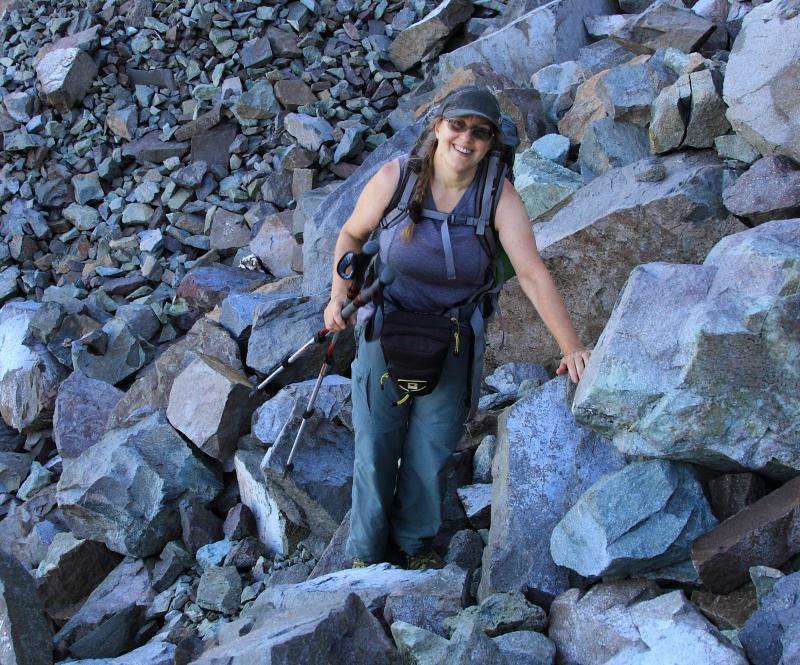 |
